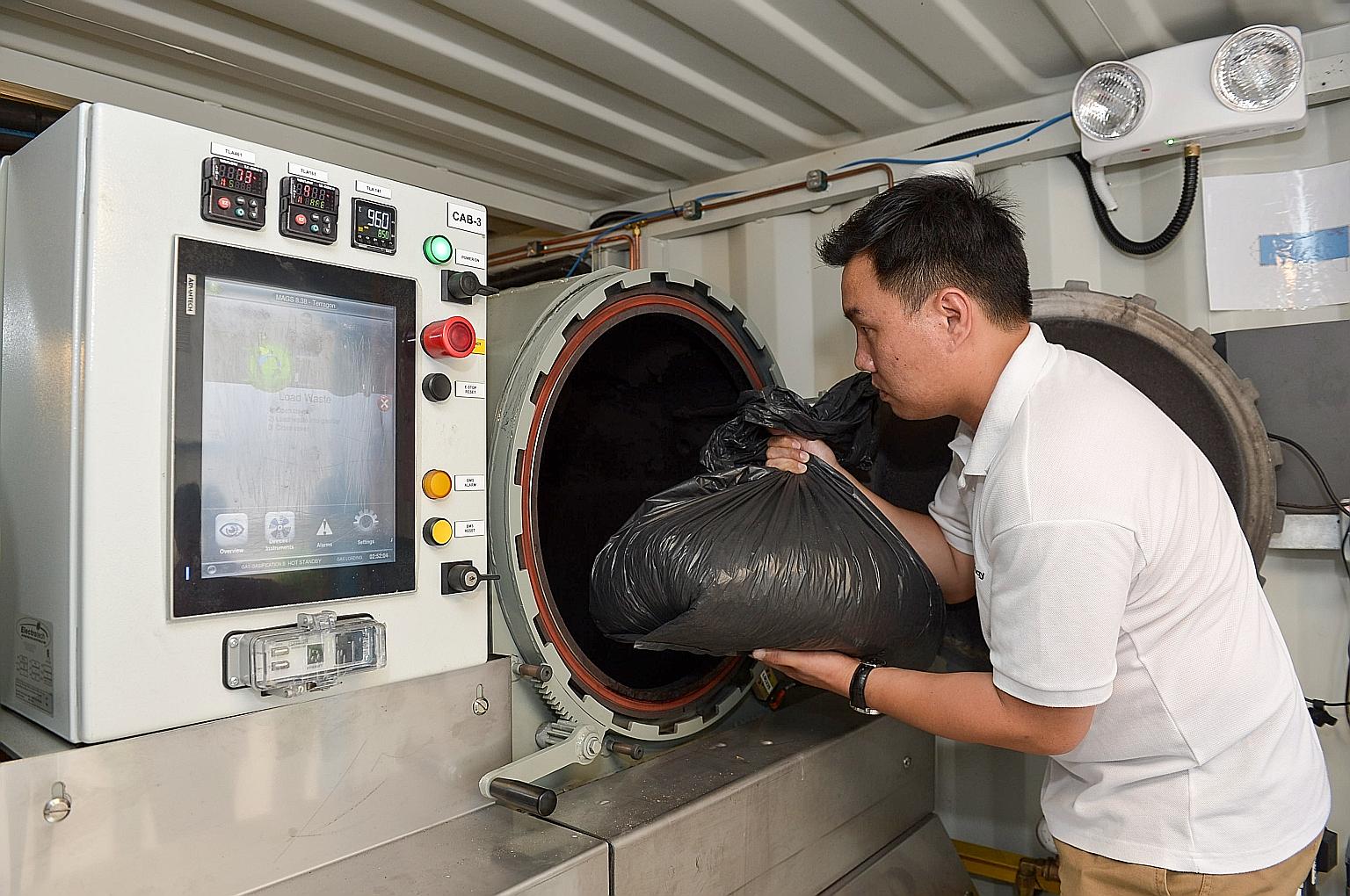Trash becomes energy at Gardens by the Bay
Garden trials system created by SP Group that turns waste into heat, material for soil treatment
Sign up now: Get ST's newsletters delivered to your inbox

Mr Dex Chen, assistant director for conservation and environmental sustainability at Gardens by the Bay, demonstrating the disposal of trash into the gasification system. The system, created by SP Group, began operating last month and will run as a pilot project till May 2021. It will help to reduce Singapore's reliance on the Pulau Semakau landfill, which is expected to be filled by 2035.
ST PHOTO: SHINTARO TAY
Visitors to nature parks overseas could be reminded to take their trash with them - but at Gardens by the Bay, leaving behind plastic waste, especially bottles and bags, may actually help the environment.
The popular tourist destination, which has received more than 50 million visitors since it opened in 2012, has adopted technology that converts trash into energy as well as a carbon-based product that may enhance plant growth.
Energy provider SP Group has created a 6m-long enclosed system that converts food waste, plastic and general waste into thermal energy at 650 deg C. This energy is used to heat a large water tank for use by food and beverage (F&B) outlets at Gardens by the Bay.
As a by-product of the chemical reaction, 5 per cent of the waste's volume becomes biochar - carbon-based chips that resemble charcoal and can be used to treat soil. Gardens will research biochar's effects on plant growth and health. As the waste is not incinerated and some carbon is locked in the biochar, Gardens by the Bay's carbon footprint is reduced by up to 20 per cent.
SP and Gardens, with the support of Singapore investment company Temasek, signed an agreement yesterday at the Ecosperity Conference 2019 to start a two-year trial of the system. The signing was witnessed by Minister for the Environment and Water Resources Masagos Zulkifli.
The conference brought together global corporate leaders, innovators and experts to discuss how business growth can thrive in a sustainable manner.
SP's system, which began operating last month and will run as a pilot project until May 2021, will help to reduce Singapore's reliance on the Pulau Semakau landfill, which is expected to be filled by 2035.
All of the chemical reactions and equipment are contained in a compact system into which food waste, plastic, cardboard and wood chips are loaded. A small amount of piped town gas is needed to start the chemical reaction, known as gasification. As the reaction generates heat, the waste is converted into synthetic gas, or syngas, containing primarily carbon monoxide and hydrogen.
The syngas then undergoes combustion to produce thermal energy. The self-sustaining process takes between 10 and 15 minutes.
The thermal energy heats a 2,000-litre water tank used by F&B outlets for consumption and washing. Previously, Gardens by the Bay heated the water with electricity.
Mr Thomas Seow, Gardens by the Bay's senior director of research and horticulture, said: "The Gardens is an ideal location for the pilot because it has a (variety) of waste that can be tested through the gasification system to find outcomes and data. Hot water and biochar can be used here and need not be transferred out of the Gardens."
This is not the first time that gasification has been used here.
Earlier this week, Nanyang Technological University launched a bigger gasification system to treat solid waste generated on campus.
"We think the system can be deployed in places such as hotels and hospitals, where there is waste and a significant need for hot water for sanitation," said Mr Jimmy Khoo, SP's chief executive for Singapore district cooling.
In the trial, SP's system will run for eight hours a day, converting about 300kg of waste.
Between four and five tonnes of waste are collected at Gardens by the Bay every day.
The project is part of the National Environment Agency's regulatory sandbox initiative, which was announced at CESS last year.
Another project approved for the initiative was a digital platform, developed by Alpha Biofuels, for logistics firms to collect and recycle used cooking oil from F&B outlets.
Correction note: In an earlier version of the story, we said that the agreement between SP Group and Gardens by the Bay was signed at the CleanEnviro Summit Singapore (CESS) Catalyst 2019 . This is incorrect. The agreement was signed at the Ecosperity Conference 2019 We are sorry for the error.


